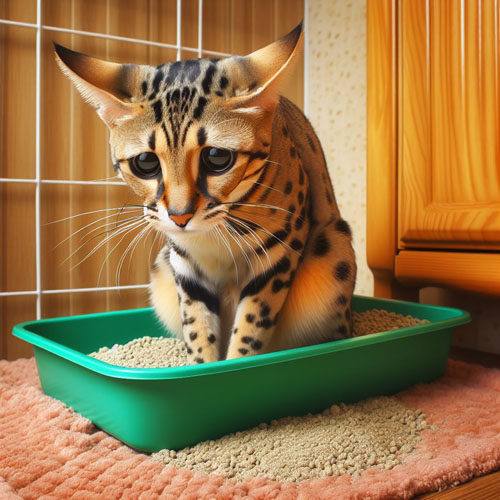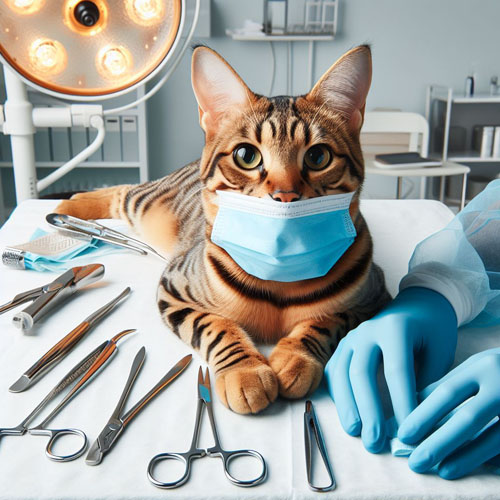Anesthesia in Savannah Cats
Anesthesia in Savannah Cats: Understanding the Risks of Ketamine
Anesthesia is a critical aspect of veterinary care, ensuring that procedures ranging from routine surgeries to diagnostic imaging are conducted with the utmost safety and comfort for animals. Savannah cats, known for their striking appearance and sociable nature, require specialized attention when it comes to anesthesia. While various anesthetic agents are available, this article will delve into the importance of tailored anesthesia for Savannah cats and shed light on why ketamine, a commonly used anesthetic, may pose risks for this particular feline breed.
Understanding Savannah Cats: Savannah cats, resulting from the crossbreeding of a domestic cat with a serval, possess unique physical and behavioral traits. Due to their specific genetic makeup, a careful and individualized approach to anesthesia is essential for ensuring their safety and well-being during medical procedures.
Anesthesia in Veterinary Practice: Anesthesia is administered to animals to induce a reversible loss of consciousness, allowing veterinarians to perform procedures without causing stress or pain to the patient. It involves a delicate balance of medications to achieve the desired effect while monitoring vital signs to ensure the animal’s safety throughout the process.
The Importance of Tailored Anesthesia for Savannah Cats: Due to the unique characteristics of Savannah cats, including their genetic makeup and behavioral traits, a one-size-fits-all approach to anesthesia is not suitable. Tailored anesthesia accounts for factors such as the individual cat’s age, weight, health status, and breed-specific considerations. Savannah cats may require adjustments in anesthesia protocols to account for their higher metabolism and potential sensitivities to certain medications.
Why Ketamine May Pose Risks for Savannah Cats: Ketamine is a dissociative anesthetic commonly used in veterinary medicine. While it is generally considered safe for many feline patients, there are specific concerns regarding its use in Savannah cats. Several factors contribute to the potential risks associated with ketamine in this breed:
- Metabolism Differences: Savannah cats, being a hybrid breed, may exhibit variations in drug metabolism compared to pure domestic cats. Ketamine’s metabolism and elimination can vary among individual cats, potentially leading to unpredictable responses in Savannah cats.
- Sensitivity to Excitatory Effects: Ketamine can sometimes induce excitatory effects, causing restlessness, muscle twitching, and even hallucinations in cats. Savannah cats, with their active and playful nature, may be more prone to heightened sensitivity to these excitatory effects, making the use of ketamine riskier in this breed.
- Cardiovascular Concerns: Ketamine can affect blood pressure and heart rate. Savannah cats, with their unique hybrid genetics, may have underlying cardiovascular sensitivities that make them more susceptible to adverse effects on their cardiovascular system during ketamine administration.
- Recovery Challenges: Some reports suggest that the recovery period from ketamine anesthesia may be prolonged in certain cats. Savannah cats may face challenges during the post-anesthetic recovery phase, making it essential to choose alternative anesthetic agents that provide a smoother recovery process.
Alternative Anesthetic Options for Savannah Cats: Given the potential risks associated with ketamine in Savannah cats, veterinarians may opt for alternative anesthetic agents that are better suited to the breed’s specific needs. Propofol, for example, is a short-acting intravenous anesthetic that provides a smooth induction and recovery, minimizing the risk of excitatory effects. Isoflurane and sevoflurane are inhalation anesthetics commonly used in veterinary practice, offering precise control over the depth of anesthesia.
The Role of Pre-Anesthetic Screening: To ensure the safety of anesthesia in Savannah cats, pre-anesthetic screening is crucial. This involves a thorough examination of the cat’s health, including blood tests to assess organ function and overall well-being. Pre-anesthetic screening helps identify any underlying health concerns that may influence the choice of anesthetic agents and dosage.
Collaboration between Veterinarians and Breeders: Effective communication between veterinarians and breeders is essential to understanding the specific needs and characteristics of Savannah cats. Breeders can provide valuable insights into the breed’s genetic background, allowing veterinarians to tailor anesthesia protocols accordingly. This collaboration ensures that the health and safety of Savannah cats are prioritized throughout medical procedures.
Conclusion: Anesthesia is a vital component of veterinary care, and its administration requires careful consideration of the unique characteristics of each individual animal, especially in specific breeds like Savannah cats. While ketamine is a widely used anesthetic in veterinary practice, its potential risks in this particular breed highlight the importance of tailored anesthesia protocols. By understanding the metabolism, sensitivities, and potential risks associated with anesthetic agents, veterinarians can provide safe and effective care for Savannah cats, ensuring their well-being during medical procedures. As our knowledge of feline genetics and anesthesia continues to evolve, the collaborative efforts of veterinarians, breeders, and cat owners play a crucial role in advancing the health and welfare of these unique and captivating feline companions.





